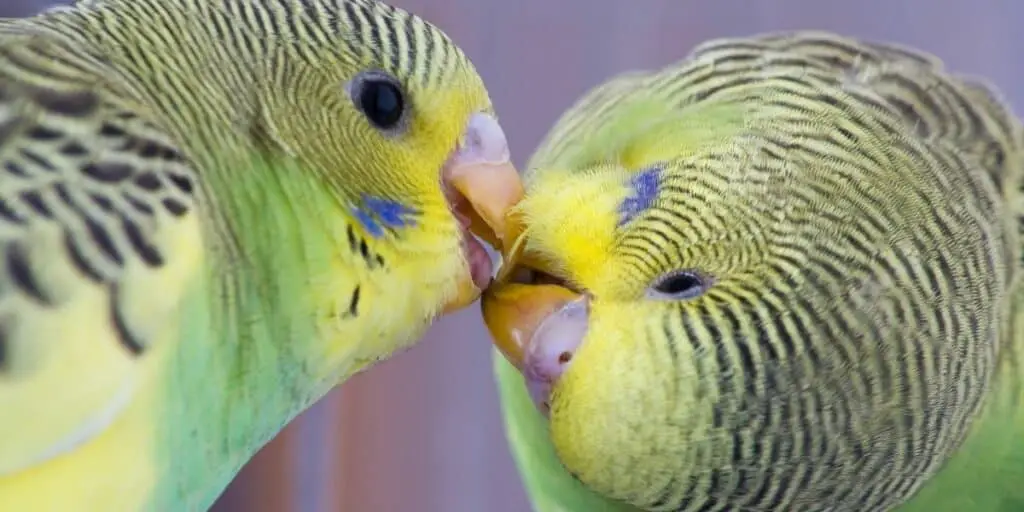If it is getting a little too noisy in the cage, you may be wondering whether those squawks and flapping are a healthy thing.
It’s important to understand your budgerigar behavior and knowing whether the budgies are playing or fighting makes all the difference in meeting their needs.
In this short article, we will take a look at the signs of affection and aggression in budgies and what you need to do if you have a fighting budgie in your cage.
Table of Contents
So how do budgies play together?
Two budgies getting on is very apparent as their affection and rapport cannot be hidden. Friendly budgies are gregarious. Key signs of friendly interaction and play between budgies include:

- Sitting closely
- Touching one another
- Bobbing, chattering, chirping, and singing together
- Grooming and preening each other
- Once budgie will regurgitate seed into their friend’s mouth
Other positive bonding behavior you may observe between two birds include touching their beaks together, and even washing and flying together from perch to perch.
Gentle scratching and biting can also be affectionate too. These positive interactions reflect their natural behaviors in their large flocks of the Australian wild.
Key signs of aggression in budgies
Owners who are trying to work out if their pet budgies are friends or foes should look out for any of these key signs of an aggressive Budgerigar.
- Hissing is the budgie equivalent of “back off!”.
- Wing raising is another threat behavior, making the budgies appear larger than they are and sparring for a fight!
- Chasing in birds can be interpreted as aggression if it is persistent.
- Dominating the food/water supply can be bullying behavior.
- Dominating a perch is also a threatening behavior. Territorial maneuvres like this can quickly escalate into a fight.
- Biting and pecking an opponent’s feet is much more than fighting talk and is done to pry the other budgie from the shared perch.
- Screaming and squawks are not the innocent chatter of well-bonded birds. These heightened sounds mean that a fight is in progress.
- Two birds hitting the floor in a fight is a very bad situation and as an owner, you will need to intervene to prevent injury or death.
Can budgies live together?
Seeing displays of aggression in budgerigars may make you feel disillusioned for the prospects of these little birds living together, but actually, budgies need all the company they can get.
Remember that in the wild budgies will live in flocks of hundreds of birds and are very social animals.
Budgies are usually very happy living in pairs of any sex. Males are known to bicker more often than females and obviously with a male and female pair, flapping and other dramatic activities could lead to some baby budgies!
What makes budgies fight?
A single bird is not ideal and will need extra effort to have its needs for company, stimulation, and interaction met by you the owner.
Aggression and fighting in budgies should be the exception rather than the norm, so if you are dealing with recurrent episodes of fighting you need to get to the bottom of why your budgie(s) has become aggressive. Common reasons for fighting in budgies include:
- A territorial disposition: some budgies are more dominant than others and will become territorial if a new budgie is introduced into the cage.
- Defense: the budgie may start to attack if they feel threatened or encroached upon by a newcomer.
- Mating behaviors: racing hormones increase territorial behaviors which can erupt into fighting.
- Stressors like sickness: illness reduces a budgies natural patience and coping strategies. Fighting may be the only sign of significant illness or pain.
- Molting: is another stressor that can bring out aggression.
- Tiredness: reduces a budgie’s ability to remain well behaved. This can be a problem if your budgie is not covered at night and has too much visual or auditory stimulation to get good sleep.
- Boredom and frustration: if the budgies are understimulated in the cage they may take out their frustrations on one another.
Top strategies for tackling aggression and fighting in budgies
Because there is often an underlying cause, you have hope that something can be done to tackle recurrent episodes of aggression in your budgies.
Aggression is always a good reason for a check-up with the vet, especially if this is a new behavior that is untypical of your bird(s).
Look at your cage critically. Are your budgies struggling with boredom or a lack of space? You may find that adding toys and treats or buying a larger cage can make all the difference.
If you are up all night watching Netflix with your budgies in the room, you are doing yourself no favors in tackling aggression. Your pets will appreciate a good night’s sleep in a quiet environment with a cover over the cage to keep ambient light to a minimum.
Introducing second budgies or a new bird to the cage can be tricky as it can bring out territorial behaviors, but any drama should settle down after a while.
In a worst-case scenario, budgerigars that cannot dwell peacefully may have to be separated or one of the offenders can be rehomed.
Rounding up.
It can be hard to interpret the behaviors you see in your budgies, but for most owners, observation and patience is key.
Thankfully there is usually something that can be done about an aggressive bird and effort to get to the bottom of the problem will be rewarded in a far more harmonious cage.





